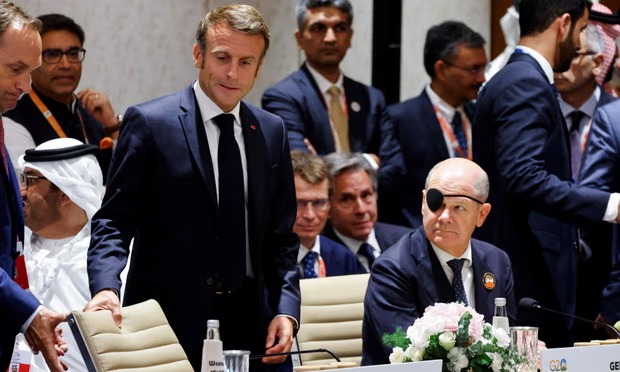The once-solid foundation of Franco-German relations, often regarded as the engine driving European Union integration, is showing signs of strain. An exclusive report reveals that this deterioration is not merely symbolic; it is affecting critical EU decisions, especially in the realms of defense and trade. David McAllister, Chair of the European Parliament’s Foreign Affairs Committee and a prominent figure in Germany’s Christian Democrats party, has voiced his concerns. He suggests that the diminished rapport between Chancellor Olaf Scholz and French President Emmanuel Macron is resulting in delays regarding key decisions on military equipment, including battle tanks and fighter jets, and even negotiations for a future trade deal with Latin America.
EU Deals on Battle Tanks, Fighter Jets, and Latin American Trade Affected
One of the most glaring examples of the faltering Franco-German relationship’s impact is the delay in crucial decisions concerning the next-generation European battle tank, a vital component of the main combat system in Ukraine and potential future conflict zones. While Paris and Berlin pledged to make progress by the end of the year after a recent meeting between French Armed Forces Minister Sébastien Lecornu and his German counterpart, Boris Pistorius, some experts believe that additional political momentum is required to expedite these decisions.
Furthermore, McAllister, a leading member of the center-right party that Angela Merkel once led, emphasizes that this issue is merely the tip of the iceberg. Progress on future aircraft development is stagnant, and discussions regarding a trade deal with the Mercosur bloc of Latin American countries remain in a state of inertia.
Concerns Over Lack of Franco-German Coordination: Merkel’s Absence Felt in the EU
Chancellor Angela Merkel, with her 16-year tenure, cultivated a close relationship with four French presidents, including Emmanuel Macron, securing her status as the de facto leader of the EU. However, her departure has left a void in this essential partnership. McAllister contends that the absence of internal coordination between Paris and Berlin is evident and concerning. While he acknowledges that the Franco-German relationship isn’t the sole driving force in Europe, he underscores its pivotal role, stating, “In the end, Paris and Berlin need to agree to smooth things … and this is where I criticize the German government. I don’t think we have seen such little cooperation between Paris and Berlin as we are witnessing at the moment.”
Impact on EU Relations Beyond France and Germany
The apprehensions expressed by McAllister find resonance in France as well. Georgina Wright, Director of the Europe Program at the Institut Montaigne think tank in Paris, acknowledges the strain in relations but cautions against exaggerating it. She highlights that, despite the existing disagreements, France and Germany continue to communicate regularly across ministries and at all levels, emphasizing the enduring importance of their relationship in the EU context.
However, this week, tensions between Berlin and Rome also came to the fore, with Italy protesting against Germany’s plans to finance two migrant NGOs operating within its borders. This discord likely contributed to Italy’s decision to withhold agreement from a new text on reforms to EU migration laws during a recent summit of interior ministers in Brussels. The broader implications of these diplomatic skirmishes suggest that the health of Franco-German relations has ripple effects throughout the European Union, affecting decisions on multiple fronts.
As the European Union grapples with an array of complex challenges, from defense strategies to trade agreements, the need for a unified and harmonious Franco-German partnership remains paramount. The question now is whether the leaders of these two influential nations can bridge the divide and reignite the engine of European integration that has served as the EU’s driving force for decades.















